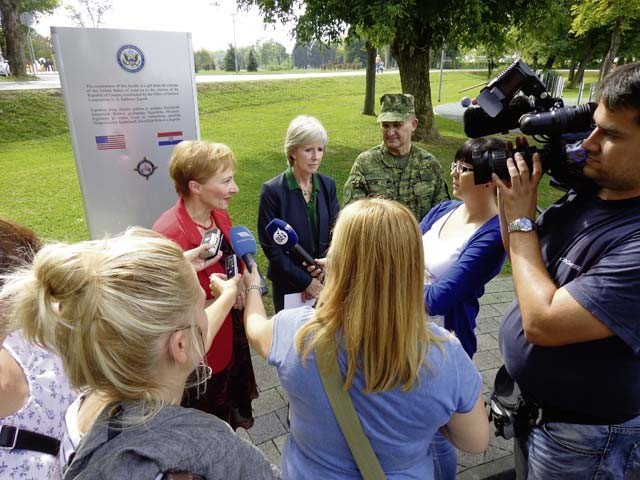
(Left to right) Local media conducts interviews Sept. 17 with Deputy Mayor of Karlovac Marina Kolakovic, U.S. Embassy Zagreb Deputy Chief of Mission (Charge d’Affaires) Margaret Nardi and the Commander of Croatian Land Forces Lt. Gen. Mate Ostovic in front of the sign that dedicates the contribution the United States European Command has made through their Humanitarian Assistance program.
SPLIT, Croatia — Soldiers from the 7th Civil Support Command and a U.S. Embassy-Croatia official traveled across the country to assess past humanitarian assistance projects and to recommend future ones, while continuing a strong partnership with a NATO ally Sept. 11 to 18.
The Army Reserve Soldiers from the 457th Civil Affairs Battalion evaluated several HA sites, including: medical equipment at emergency response clinics, a high school dining facility and dormitory roof reconstruction, and an outdoor therapy facility for children with special needs.
There are four types of HA that United States European Command provides, including Humanitarian Civic Assistance, HA, Excess Property, and Minimum Cost, said Diana Marsic, HA project coordinator for the U.S. Embassy in Croatia.
The latter type of HA was used to purchase four defibrillators in late 2013 for Croatian emergency medical services, which were assessed by Marsic and the civil affairs team. The machines are meant to jump start a person’s heart when it stops beating.
“All four (defibrillators) are still in use,” said Dr. Radmila Majhen Ujevic, a physician at the Institute of Emergency Medicine Split-Dalmatian County. “They save lives.”
The defibrillators were donated by the EUCOM HA program.
“In the future, we need a CPR machine,” Ujevic said.
The assessment of the Outdoor Physical Therapy Facility in Karlovac on Sept. 16 was a high-visibility event, said Army Maj. Kevin Kaufman, chief of the civil affairs planning team.
The U.S. Embassy Zagreb Deputy Chief of Mission, Charge d’Affaires, Margaret Nardi met with the Deputy Mayor of Karlovac Marina Kolakovic and participated in a walk-around tour of the outdoor facility, Kaufman said.
“Local news media interviewed both Nardi, who speaks great Croatian, and Kolakovic, both of whom expressed the importance of the facility to not just the physically disabled who use it for therapeutic purposes, but also for the general public who use it throughout the day, and into the evening time, as a meeting and recreation facility,” Kaufman said.
The 7th CSC Soldiers felt their HA assessments had a positive impact on Croatia, which emerged from a war of independence in 1995. Croatia joined NATO in 2009 and most recently joined the European Union in 2013.
“I think it (the donated medical equipment) made a huge difference in what they’re doing here and hopefully we can foster a good relationship, and we can continue good efforts like this,” said Army Pfc. Carl Youngblood, a civil affairs specialist with the 457th. “There will always be positive impacts in what we’re doing here in cooperation with them.”
In addition, the 7th CSC CA assessment team partnered with the Croatian Army to perform key leader engagements concerning disaster management, which also helped build partner nation capacity.
The Soldiers were tasked to determine four things:
• If HA/HCA projects in Croatia were effectively implemented and sustained by Croatian authorities
• Whether or not existing HA/HCA projects in Croatia are achieving EUCOM and United States Army Europe strategic objectives
• How limited funds can potentially be better spent
• To gain a better understanding of HA needs in Croatia in order to focus HA/HCA projects to maximize their effectiveness.
The team is proud they were able to make a difference in countries that have experienced political and military turmoil, Kaufman said.
“It’s an honor for us to be able to come in and help where we can,” he said.


